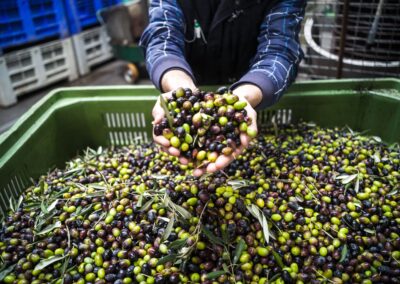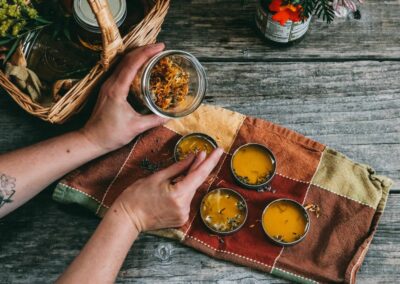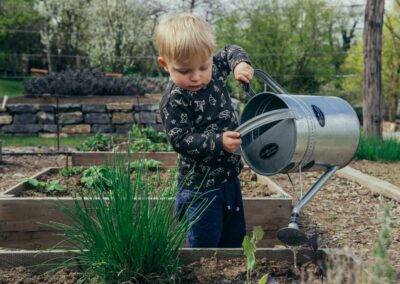Some days, I remember living in the city like it was yesterday. On my way back from work (almost every day) I would stop by the supermarket and buy whatever I felt like eating that night – pre-cut vegetables, clean fruit in a tiny plastic container, some snacks, something nice to drink,… Healthy? Not always. Convenient? O yes…
Moving to rural Spain was a bit like moving to another dimension. Everything I had come to get used to – the year-round identical assortment of fruit and vegetables, pre-cut veggies or pre-packed meals at the supermarket, take-away or home delivered food for really lazy nights – none of that was available right here. Oh, it can be found – big supermarkets in the cities will sell fruit and greens from all over the world, a dozen different brands of the same thing and all the processed food I would ever want. But… is this really what I want?
I grew to really love the small stores in the nearby villages.
- Jose Ramon in Lledo, who has an amazing range of products (from fresh bread to toys, from vegetables to local honey, canned olives and so much more),
- The bakery in Cretas with their wood-burning oven,
- The local butchers who will sell every single part of the animal (not just the nice looking parts you find in supermarkets).
They and many others have made my life so much better.
For big grocery shopping, we still go to the mini-marts in a nearby town – but even they are so different from the hypermarkets. Selling meat from the local abattoir, wine from the local bodegas, and olive oil from the local cooperativas – shopping there still makes me happy to support the local economy.
As far as I’m concerned, conscious grocery shopping has 3 different aspects: shopping locally, shopping seasonally, and shopping healthy.
1. Shopping Locally Supports the Local Economy
There is so much going in this area. A drive around the countryside usually leads us past a shepherd out with his flock of sheep and goats, almond and olive orchards, vineyards and vegetable gardens, and several pig, chicken or turkey farms.
We try to grow our own food, and what we don’t grow ourselves, we prefer to buy from our “organic guy” who drives around weekly to deliver his harvest to us.
When shopping for other stuff, it makes me happy to recognise the labels: the winery in the next village uses our neighbours’ grapes, the cooperativa in Cretas is where we brought our olives last year, and the local butchers will be able to tell you exactly where the meat comes from (sometimes it’s from their own backyard). Do local almonds taste better than the ones from California? Honestly, I don’t care.
When I shop locally, I know I’m helping the local economy. The shop I spend my money at, will in turn buy food from local producers, who in turn will get their raw material (fruit, vegetables, nuts, meat) from local farmers. I might not always love their methods (they’re not always organic), but I certainly don’t want them to go bankrupt.
Maybe I’d have more choice, get a better known brand or have a more convenient parking spot at the hypermarkets in the city, but every cent I spend there is a cent not spent helping small businesses around here survive.
2. Eating according to the Seasons keeps you Grounded
It’s a fact of nature: most fruits and vegetables won’t grow year-round in one place.
Every variety has its season, and as far as I know, there are only a few ways to get something in the “wrong” season: either you get a variety that keeps well, or you preserve it (by canning, drying, freezing or other methods).
They can sometimes be grown in a less natural setting – in the perfectly controlled atmosphere of a greenhouse, growing in a chemical compound that cannot be called soil, and tasting nothing like what their “natural” counterparts taste like; or you get it flown in from a country far far away – where the seasons are just right when they’re not good here.
Most unseasonal vegetables/fruit in supermarkets literally come from the other end of the world.
I realise many people see the lack of unseasonal fruit and veggies as a major inconvenience; it took some getting used to for me as well. I’ve grown to love it though; I get excited when I see the first mandarines being sold at roadside shops or when it’s finally time for tomato galore again. Not having everything year-round, helps me appreciate food more when it’s finally in season and available.
And let’s be honest, do I really need to make a winter stew in summer?
3. Cooking from Scratch is Good for the Soul
I love to cook from scratch. It might take a bit more time than putting a box in the microwave, but what we get is so much more tasty, healthy and fulfilling. It allows me to anticipate: whether I’m walking in my garden looking at what’s ready to be harvested, or I just got a big bag of random produce from a neighbour, or I’m buying some basics like rice, flour or cooking oil – I get to imagine the nice things I’m going to make with them. This is half the fun.
Then there’s the process of cooking (or in many cases, baking): I love to take my time for it. Maybe put on a video on while I cut the vegetables or wait for the water to boil; adding herbs and spices, smelling the flavours, and tasting before adding more spices (there is no such thing as too many spices). It’s even more fun when we can cook together and learn new recipes from each other.
Food tastes so much better when I start making the meal in my head, assemble the ingredients from different places and get to cut and cook them up myself; no microwave dinner can top that.
How about you, dear reader? Do you shop locally or prefer the supermarket? Do you shop seasonally or are you unable to resist summer fruit in winter? Do you enjoy cooking from scratch, or is convenience food just so much more… convenient? I’d love to hear how you feel about this!











0 Comments